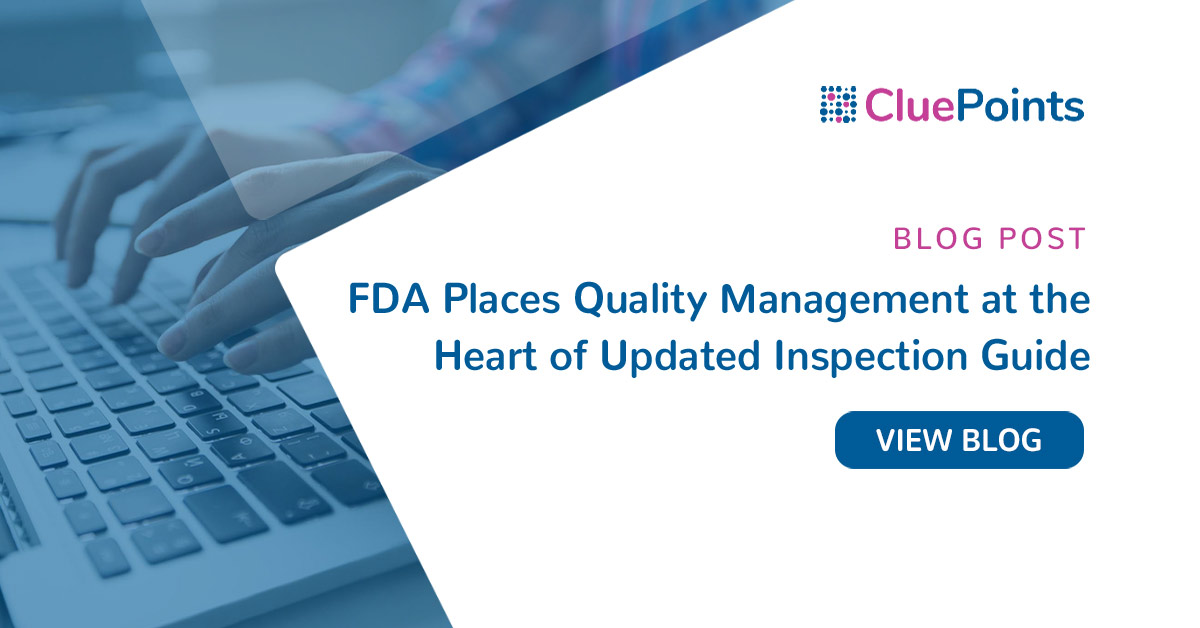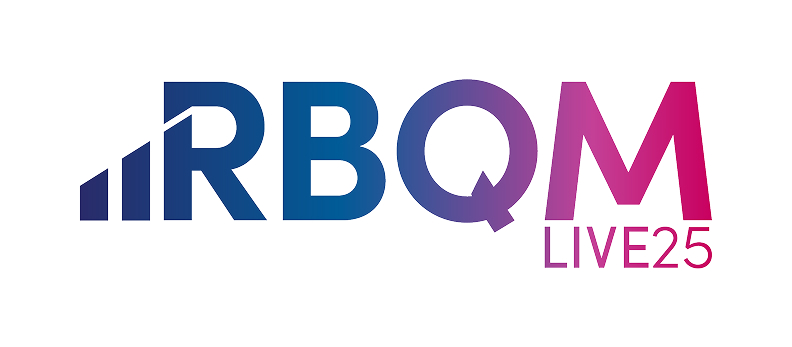AUTHOR: PATRICK HUGHES, CO-FOUNDER & CHIEF COMMERCIAL OFFICER, CLUEPOINTS
It’s official: Risk-Based Quality Management (RBQM) is no longer optional. It’s essential for the smooth running of clinical trials.
The latest version of the FDA’s Bioresearch Monitoring Program (BIMO) guide calls for quality management systems to play a more significant role in regulatory inspections. Good Clinical Practice (GCP) inspections now emphasize safety oversight, oversight of outsourced services, and the selection and monitoring of clinical investigators, among other areas.
This shift signals a new expectation: quality must be designed into trials rather than checked after the fact.
Table of Contents
The FDA’S BIMO Update: What’s Changed & Why It Matters
What Inspectors are Looking for Under the New BIMO Framework
Adapting to Remote Monitoring: New Scrutiny & Compliance Concerns
The Global Regulatory Landscape Is Aligning Around RBQM
ICH E6(R3): Quality by Design & the Rise of Remote Oversight
Why RBQM is a Strategic Advantage
The Value of a Clean Dataset & Regulatory-Ready Audit Trial
What This Means for Sponsors, CROs & Sites
RBQM as a Catalyst for Smarter, Safer Trials
The Future Is Quality-Driven, Risk-Aware & Real-Time
The FDA’s BIMO Update: What’s Changed & Why It Matters
The update to the BIMO handbook, which covers all aspects of the conduct and reporting of FDA-regulated research, clearly advocates a new working method that boosts participant safety and the likelihood of trial success.
RBQM technologies have proven their worth by enabling researchers to detect real-time data quality issues. This was most notable during the race for a COVID-19 vaccine. In Pfizer’s pivotal trial, RBQM helped process vast quantities of data from several global sites with remarkable speed and oversight.
Now, RBQM is driving a permanent shift in how clinical trials are managed, particularly in decentralized and hybrid trial models, where real-time oversight is even more critical.
The revised BIMO guidelines, a cornerstone of the FDA pre-approval process for all new medicines and medical devices, were released in September, and their impact is already being felt across the industry.
What Inspectors Are Looking for Under the New BIMO Framework
Historically, the FDA has focused on reviewing standard operating procedures (SOPs) and confirming whether processes were followed. But that’s changing.
The agency now expects organizations to take a risk-based approach to monitoring procedures and activities. That includes:
- A trial’s written monitoring plan, whether it was followed, and if not, why
- Documentation of any modifications made to standard procedures
- Evidence of a risk management plan for safety oversight, placing RBQM at the heart of sponsor responsibilities
Inspectors will also scrutinize the trial’s data management plan, SOPs for collecting and managing data, and written agreements between sponsors and contract research organizations (CROs).
Sponsor oversight of CROs is under scrutiny. This includes assessing CRO qualifications, evidence of protocol-specific training, and how roles and responsibilities were delegated and documented.
Adapting to Remote Monitoring: New Scrutiny & Compliance Concerns
The updated BIMO guide also outlines how FDA inspectors will evaluate remote access practices to account for the increased use of remote monitoring during the pandemic.
Investigators will look at:
- How remote monitors accessed site files
- Use of screen-sharing tools and direct access to electronic medical records,
- Whether data confidentiality and security protocols were followed correctly
This highlights the growing importance of having audit-ready systems that can demonstrate compliance across on-site and remote workflows.
The Global Regulatory Landscape Is Aligning Around RBQM
The FDA isn’t alone. Regulatory bodies worldwide emphasize RBQM and data quality as core pillars of GCP compliance.
For example, the MHRA’s updated Good Clinical Practice (GCP) guidance on Oversight and Monitoring Activities, published just months after the BIMO revision, reinforced this message. It even included a CluePoints case study to demonstrate the power of Centralized Statistical Monitoring (CSM) in detecting risk signals.
In that study, a Phase II vaccine trial involving 16,000 patients across 200 investigator sites, CluePoints’ SMART™ engine flagged outlier data from several sites. Specifically, it identified abnormally low mean body temperature readings at sites in one country. The discrepancy, too subtle to detect via traditional monitoring, was revealed immediately through CSM. This allowed for rapid corrective action, including replacing faulty thermometers before data integrity was compromised.
ICH E6(R3): Quality by Design & the Rise of Remote Oversight
Further momentum came from the ICH E6 Guidelines for Good Clinical Practice, released in April 2021. These guidelines underscored:
- Quality by design as a central tenet of trial planning
- The value of risk-based monitoring
- Reducing reliance on 100% source data verification
- Encouraging more effective remote oversight practices
Together, these regulatory updates show a clear direction: real-time, centralized data analysis and risk detection are no longer future goals but current expectations.
Why RBQM Is a Strategic Advantage
RBQM is no longer just beneficial; It’s a critical operational framework for modern trials.
By using centralized platforms to access trial data, collaborate on investigations, and document any mitigations or corrective actions, sponsors are better equipped to meet FDA expectations and deliver safer, faster results.
Central monitoring, in particular, supports:
- Real-time data review
- Enhanced patient safety
- Reduced trial costs
- Continuous tracking of non-compliance events, including root cause analysis and effectiveness of corrective actions
These functions align directly with the FDA’s emphasis on proactive quality oversight, transparency, and audit-readiness.
The Value of a Clean Dataset & Regulatory-Ready Audit Trial
One of the biggest advantages of a well-implemented RBQM system is the ability to generate a clean dataset and a robust audit trail.
This becomes especially valuable when:
- Preparing for inspections
- Responding to regulatory queries
- Demonstrating corrective and preventive action (CAPA) processes
- Showing that risks were assessed, tracked, and mitigated in real time
- The revamped BIMO guidance puts a premium on this level of transparency. It’s no longer enough to have documentation; it must be searchable, structured, and defensible.
What The BIMO Update Means for Sponsors, CROs & Sites
The BIMO update is a call to action for everyone involved in trial oversight.
Clinical teams must now ensure that:
- Risk management plans are tailored and actionable
- Training and documentation are thorough and centralized
- RBQM platforms are integrated into daily workflows
When implemented correctly, these strategies reduce costly delays, improve participant engagement, patient engagement, and lead to more resilient, inspection-ready trials.
RBQM as a Catalyst for Smarter, Safer Trials
With regulators raising the bar, RBQM is positioned to do more than meet compliance—it can drive measurable improvements across the trial lifecycle.
Sponsors who adopt a strategic, technology-enabled RBQM approach will benefit from:
- Faster decision-making
- Lower operational costs
- Greater data integrity
- A competitive edge in a risk-averse regulatory environment
The Future Is Quality-Driven, Risk-Aware & Real-Time
As the regulatory landscape evolves, quality management must evolve with it. The FDA’s BIMO update is just one sign of a broader shift toward real-time oversight, centralized data monitoring, and proactive risk mitigation.
At CluePoints, we believe these changes will lead to more effective, more equitable, and ultimately more successful clinical trials. Want to learn how CluePoints can help your team meet the new FDA expectations?
Click here to download our Ultimate Guide to RBQM to explore the fundamentals, benefits, and real-world applications of this transformative approach, or get in touch to start a conversation.




